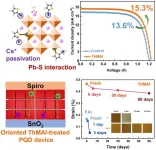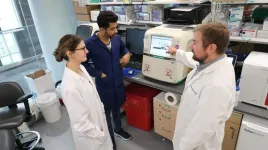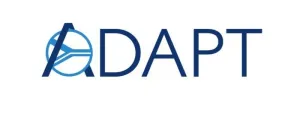(Press-News.org) □ Professor Jongmin Choi’s team from the Department of Energy Science and Engineering at DGIST (President Kunwoo Lee) conducted joint research with Materials Engineering and Convergence Technology Professor Tae Kyung Lee from Gyeongsang National University and Applied Chemistry Professor Younghoon Kim from Kookmin University. The researchers developed a new method to improve both the performance and the stability of solar cells using “perovskite quantum dots.” They developed longer-lasting solar cells by addressing the issue of distortions on the surface of quantum dots, which deteriorate the performance of solar cells.
□ Perovskite quantum dots are critical materials for next-generation solar cells. They have excellent light-to-electricity conversion capabilities and are easy to mass-produce. However, to utilize them in solar cells, the “ligands” attached to the quantum dot surface must be replaced. This process often leads to distortions of the quantum dot surface, resembling crumpled paper, which results in decreased performance and shorter lifespans for the solar cells.
□ To address this issue, Professor Jongmin Choi’s team newly adopted short ligands that securely hold the quantum dots from both sides, effectively uncrumpling the distorted surface. The ligands help restore the distorted lattice structure, smoothing the crumpled surface of the quantum dots. This significantly reduces surface defects, enabling the solar cells to operate more efficiently and extending their lifespan. Consequently, the power conversion efficiency of the solar cells increased from 13.6% to 15.3%, demonstrating stability by maintaining 83% of their performance for 15 days.
□ “Through this research, we could minimize surface defects on the quantum dots and stabilize their surfaces by newly adopting these amphiphilic ligands, thereby significantly improving the efficiency and stability of the solar cells,” said Professor Jongmin Choi from the Department of Energy Science and Engineering at DGIST. “We plan to continue our research on stabilizing the surface of perovskite quantum dots, hopefully applying the results to various photoelectric devices.”
□ This study was a joint effort by the research teams of DGIST Professor Jongmin Choi, Gyeongsang National University Professor Tae Kyung Lee, and Kookmin University Professor Younghoon Kim, led by Gayoung Seo and Sanghun Han from DGIST, along with Donggyu Lee, a Ph.D. candidate from Gyeongsang National University. The study was supported by the National Research Council of Science & Technology’s Creative Convergence Research Project, the DGIST R&D Program, and the New Faculty Research Foundation Project at Gyeongsang National University. The research findings were published in the international journal Chemical Engineering Journal on September 15, 2024.
- Corresponding Author E-mail Address : whdals1062@dgist.ac.kr
END
DGIST restores the performance of quantum dot solar cells as if “flattening crumpled paper!”
2024-10-04
ELSE PRESS RELEASES FROM THIS DATE:
Hoarding disorder: ‘sensory CBT’ treatment strategy shows promise
2024-10-04
Rehearsing alternative outcomes of discarding through imagery rescripting shows promise as a treatment strategy for people who hoard, a study by UNSW psychology researchers has shown.
Hoarding disorder is a highly debilitating condition that worsens with age. People who hoard form intense emotional attachments to objects, accumulate excessive clutter, and have difficulty discarding possessions. Many avoid treatment.
People who hoard also experience more frequent, intrusive and distressing mental images in their daily lives, says Mr Isaac Sabel from the Grisham Research Lab, an experimental clinical psychology research group at UNSW Sydney.
“Negative ...
Water fluoridation less effective now than in past
2024-10-04
The dental health benefits of adding fluoride to drinking water may be smaller now than before fluoride toothpaste was widely available, an updated Cochrane review has found.
The team of researchers from the Universities of Manchester, Dundee and Aberdeen reviewed the evidence from 157 studies which compared communities that had fluoride added to their water supplies with communities that had no additional fluoride in their water. They found that the benefit of fluoridation has declined since the 1970s, when fluoride toothpaste became more widely available.
The contemporary studies were conducted in high-income countries. The impact of community water fluoridation ...
Toddlers get nearly half their calories from ultra-processed foods
2024-10-04
Toddlers in the UK obtain nearly half (47%) of their calories from ultra-processed foods (UPFs), and this rises to 59% by the age of seven, according to a new study led by UCL researchers.
The study, published in the European Journal of Nutrition, looked at data from 2,591 children born in the UK in 2007 and 2008 whose parents recorded what their children ate and drank over three days.
The most common UPFs consumed by the toddlers – who were 21 months when their parents recorded their diets – were flavoured ...
Detroit researchers to examine links between bacterial infections, environmental pollution and preterm birth
2024-10-03
DETROIT — A new grant will help Wayne State University researchers explore the links between bacterial infections, the environmental factors that increase their susceptibility and the risk of preterm birth.
The five-year, $2,858,821 grant from the National Institute of Environmental Health Sciences of the National Institutes of Health, “PFAS increases susceptibility to infection-mediated preterm birth,” will be led by Michael Petriello, Ph.D., assistant professor in Wayne State’s Institute of Environmental Health Sciences and Pharmacology in the School of Medicine.
Petriello hopes that the team’s studies will identify critical pathways responsible ...
In lab tests, dietary zinc inhibits AMR gene transmission
2024-10-03
Highlights:
Antimicrobial resistance is a growing threat.
Bacteria exchange AMR genes in the gut via circular genetic material called plasmids.
In lab experiments, bacteria transferred plasmids with AMR genes in the presence of zinc at reduced or nonexistent rates.
Stopping the transfer without killing microbes may help reduce AMR without disrupting the gut microbiome.
Washington, D.C.—Genes responsible for antimicrobial resistance (AMR) can spread from microbe to microbe through circular genetic material called plasmids, and ...
Two UMD Astronomy space probes advance to next round of $1 billion NASA mission selection
2024-10-03
On October 3, 2024, NASA announced that two space probes proposed by University of Maryland astronomers have advanced to the next round of consideration for a $1 billion mission slated to launch into orbit in 2032.
The selected probes include the Advanced X-ray Imaging Satellite (AXIS) mission with UMD Astronomy Professor Christopher Reynolds as its principal investigator and the PRobe far-Infrared Mission for Astrophysics (PRIMA) with UMD Astronomy Professor Alberto Bolatto as a co-investigator and NASA Goddard Space Flight Center researcher and UMD Astronomy ...
New MSU research sheds light on impact and bias of voter purging in Michigan
2024-10-03
MSU has a satellite uplink/LTN TV studio and Comrex line for radio interviews upon request.
Images and Podcast
EAST LANSING, Mich. – In recent years, some states have prioritized purging their voter rolls of those who have passed away or moved out of state. During election season, there is often increased discussion about the necessity and impact of these actions. Voter purging can be an important step for creating election integrity, but others have raised concerns about how the process is conducted and who it targets.
So, are there negative effects of voter purging? Researchers from Michigan State University wanted to find out — especially ...
Funding to create world's first ovarian cancer prevention vaccine
2024-10-03
In this study, the Cancer Research UK-funded scientists will establish the targets for the vaccine. They will find out which proteins on the surface of early-stage ovarian cancer cells are most strongly recognised by the immune system and how effectively the vaccine kills mini-models of ovarian cancer called organoids.
If this research is successful, work will then begin on clinical trials of the vaccine. The hope is that in the future, women could be offered this vaccine to prevent ovarian cancer in the first place.
There are around 7,500 new ovarian ...
Scientists develop novel method for strengthening PVC products
2024-10-03
COLUMBUS, Ohio – Researchers have developed a way to make one type of plastic material more durable and less likely to shed dangerous microplastics.
The study identified a secure way to attach chemical additives to polyvinyl chloride (PVC).
Found in everything from toys, construction supplies and medical packaging, PVC plastics currently rank third among the most used plastics worldwide. Despite its widespread use, pure PVC is brittle and sensitive to heat, and manufacturers can only utilize it after stabilizing its properties with other chemicals.
However, these additives, or plasticizers, ...
Houston Methodist part of national consortium to develop vaccine against herpesviruses
2024-10-03
Houston Methodist researchers will be part of a national consortium funded by an up to $49 million award from the U.S. Government’s Advanced Research Projects Agency for Health (ARPA-H) to develop a vaccine against two of the most common and destructive strains of herpesviruses that latently infect a majority of Americans and can lead to acute infections, multiple forms of cancer, autoimmune disease and birth defects.
The award is part of ARPA-H’s Antigens Predicted for Broad Viral Efficacy through Computational Experimentation (APECx) program and will fund the America’s SHIELD project ...



